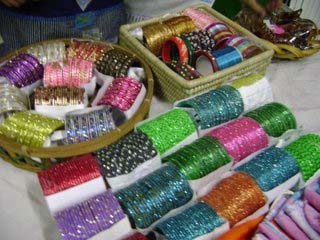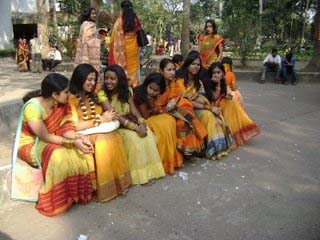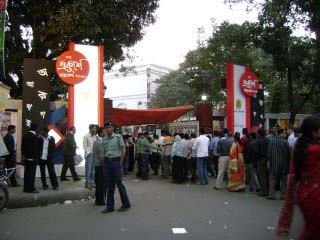After their photo and video training, the Nari Jibon bloggers are increasingly using both to tell stories on their blogs.
Nari Jibon gets a visit:
Its always great when your work is evaluated by an outsider and you can learn about your mistakes and get encouragement.
Earlier this month Kira Kariakin Ramírez, a Venezuelan photo journalist working in Bangladesh came to Nari Jibon's office in Dhaka, Bangladesh and met with the group of Nari Jibon's women citizen journalists. Around 50 bloggers and project staff attended the gathering. Ms. Kira explained the importance of blogging, the advantage of having a Flickr account, the use of Facebook, and more. She highlighted the importance of having personal blogs, which may encourage Nari Jibon bloggers to open personal blogs instead of only blogging on the collective Nari Jibon Bangla and English-language group blogs.
Here are the details of the training from their Rising Voices project blog .
Ms. Kira wrote about her experience in this beautiful post (es), which includes many pictures, in her personal blog:
“We concluded that we can use blogs for what we want: we can write intelligently about what is important to us, our country or the world. For some, blogging may be expression of freedom.
In the case of Nari Jibon, for these intelligent, beautiful and courageous women, blogging might be a way to let the world know about them, and to know other worlds.” – (Machine translation)
Blogging training continues:
The Nari Jibon project continued to train new/old students about blogging so that they can begin to tell their stories using texts, photos and videos.
Some of the bloggers are singing a song “We shall over come some day” in a Blog workshop of Nari Jibon
Here comes the spring:
Taslima welcomes spring in Bangladesh terming it the ‘queen’ of seasons. She posts some pictures of flowers to prove that.
Flowers of spring blossoming
Falgun is the eleventh month in the Bangla Calendar, which marks the advent of spring. The first day of Falgun usually falls on the 13th February of the Gregorian Calendar and is marked with colorful celebration. Yellow is the color of spring in Bangladesh. Traditionally, women wear yellow saris to celebrate this day.
Young women dressed in yellow sarees to welcome the first day of spring
Sherin Sultana writes:
Everywhere it looks like a fair of colors of nature. In this time I feel that the nature plays and decorates her with many colors.
And Spring also arouses peoples’ emotions. She then remembers her lost love:
Many years ago, I met with you for the last time in the morning of 1st Falgun. After that many Falgun have passed. I used to remain so anxious to see you, to meet you and to talk with you just for a moment. But I never explained my feelings for my nervousness. That’s why I had to leave all of my dreams and feelings.
……
So I wait for you every first morning of the Falgun by wearing Basanti (Deep Yellow) colored saree.
Watch this video to learn how young people at the Dhaka University campus had celebrated the first day of spring this year.
The Festivities are ubiquitous. There is even a spring fair of housewives in Dhaka. Mohtarimun Nahar [Bipa] brings us more:
All the sellers are housewives here. The fair is arranged in a room. But there are many items to sell; those are: three-pieces, shawls, bed covers, skirt-tops, ornaments, Bangles, sarees etc. Some dry foods and drinks are also sold in this fare.

Churis or glass bangles on display
Bipa also posts some pictures of the fair.
Ekushey book fair:
February is the month of Ekushey February (21st February) or the remembrance of the struggle Bangladeshis had to face to uphold their mother tongue Bangla. The UNESCO adopted this day as International mother language day to pay tribute to the martyrs of the Bangla language movement who died on this day in 1952.
To promote Bangla language and literature a month long book fair titled “Ekushey Boi Mela” is arranged by Bangla Academy each year since 1974. Firoza Begum Poly writes about the importance of the Ekushey Book fair:
We embrace new development, match our experience, deepen our thought, and enlightened our cherished dream by reading a book. If this book is written in Bangla, we feel much comfort while reading it than the book of any other language.
Firoza also posts some pictures of the Book fair.
Kazi Rafiqul Islam shares his thoughts about the growing encroachment of English language in the society:
“Talking in English has become a fashion of our young generation. We must learn English to develop ourselves and it is also needed for our country’s development and at the same time we should not forget to learn our own language Bengali (Bangla). To develop our Bengali literature and establish Bengali language we need to translate many books, articles and journals in Bengali that are written in other languages.”
South Asian Community unites against domestic violence:
Kathryn B. Ward, founder of Nari Jibon, informs about an advocacy website:
Out Against Abuse, started in January 2008 to educate and organize the South Asian community in USA against gender abuse-domestic violence through information, interviews with activists, and comments-participation by readers.
From the Bangla blogs:
Hasina Akhter describes the art Planetarium in Dhaka called Bhasani Novo Theatre:
৫,৪ একর জমির উপর ভাসানী নভোথিয়েটারের অবস্থান। এ প্রকল্পে রয়েছে তিন তলাবিশিষ্ট মূল নভোথিয়েটার ভবন, ভবনের কেন্দ্রভাগে দৃষ্টি নন্দন অ্যালুমিনিয়াম মেটালি ডোম, ভেতরে ২৭৫ টি বিশেষ ধরনের আসনবিশিষ্ট প্লানেটরিয়াম, ১৭০ আসন বিশিষ্ট অডিটরিয়াম।
Bhasani Novo Theatre is built on 5.4 acres of land. In this project there are the three stories high main Novo Theatre building with a spectacular metallic dome at the center, a planetarium with 275 seats and another auditorium with 170 seats.
Taufika Farzana writes about the struggle of a women named Jharna in her post:
একবিংশ শতাব্দির যুগেও বাংলাদেশ এখনও দারিদ্র এবং অশিক্ষার কড়াল গ্রাশে নিমজ্জীত। এখানে নিম্নবিত্ত পরিবারে স্কুল বয়সী ছেলে মেয়েরা স্কুল যাওয়ার পরিবর্তে কাজে বের হয়। তাদের পরিবার তাদের উপর নির্ভরশীল হয়।
….
সে বুঝতে পেরেছে জীবনে, লেখাপড়া ছাড়া কোন মূল্য নেই। তাই সে তার মেয়েদের স্কুলে ভর্তি করে দেয়। তার বড় মেয়ে তৃতীয় শ্রেণীতে পড়ে এবং ছোট মেয়ে ক্লাশ ওয়ান পড়ে। তার মনে অনেক আশা মেয়েদের সে লেখাপড়া শিখাবে মানুষের মত মানুষ করবে। তার জীবনের মতো যেন না হয় তাদের জীবন।“In this 21st century some of Bangladesh is covered by darkness of poverty and illiteracy. Children of poor families have to go to work instead of schools. Their families have to depend on their incomes too.
…..
She realized that there is no alternative to education in life. So she has sent her children to school. Her elder daughter goes to grade three and the younger daughter to grade one. She has a dream to get them educated properly so that they can get established in their lives. She will make sure their lives will not be filled with struggles like her.”
Some more Bangla poems were also posted:
* ‘The morning of 21st February’ by Sufiya Khatun
* ‘When Falgum comes‘ by Jannatul Fardoush
* ‘Tree‘ by Hazera Akter Sherin Shela
* ‘Bird of freedom‘ by Farzana Akter
Get more updates on the Nari Jibon blogging project from their English Blog ‘Bangladesh from our views‘, their Bangla Blog ‘Amader Kotha (our stories)‘, their blog on rising voices “Bringing New Dhaka Female Voices to Blogging“, and their Flickr account.







1 comment